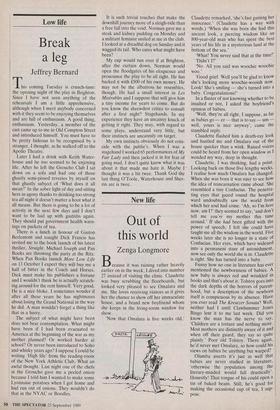New life
Out of this world
Zenga Longmore
Because it was raining rather heavily earlier on in the week, I dived into number 27 instead of visiting the clinic. Claudette was busy scrubbing the floorboards, but looked very pleased to see Omalara and me. She loves receiving visitors as it gives her the chance to show off her immaculate house, and a brand new boyfriend whom she keeps in the living-room window for show.
'Now that Omalara is five weeks old,' Claudette remarked, 'she's fast gaining her innocence.' (Claudette has a way with words.) 'When she was born she had this ancient look, a piercing wisdom like an 800-year-old man who has spent the best years of his life in a mysterious land at the bottom of the sea.'
'What! You never said that at the time!' 'Didn't I?'
'No. All you said was woochie woochie woo.'
'Good grief. Well you'll be glad to know she's looking more woochie-wooish now. Look! She's smiling — she's turned into a baby. Congratulations!' In a fluster of not knowing whether to be insulted or not, I asked the boyfriend's opinion of babies. 'Well, they're all right, I suppose, as far as babies go — er — that is to say — urn — well, yours is nice anyway', came the stumbled reply. Claudette flashed him a death-ray look and hustled me and Omalara out of the house quicker than a wink. Raised voices could be heard from her open window as I wended my way, deep in thought.
Claudette, I was thinking, had a point. Looking back on those five lengthy weeks. I realise how much Omalara has changed. When she was born it was easy to see how the idea of reincarnation came about. She resembled a tiny Confucius. The penetra- ting eyes that gazed round the hospital ward undoubtedly saw the world from which her soul had come. `Ah, so I'm here now, am l?' they seemed to say, 'and don't tell me you're my mother this time around.' If she had been gifted with the power of speech, I felt she could have taught me all the wisdom in the world. Five weeks later she is no longer in a state of Confucian. Her eyes, which have widened into a permanent stare of astonishment, now see only the world she is in. Claudette is right. She has turned into a baby. Funny how no one in literature has ever mentioned the newbornness of babies. A new baby is always red and wrinkled in books and that's about it. Tolstoy goes into the dark depths of the horrors of parent- hood, but a description of the newborn itself is conspicuous by its absence. Have you ever read The Kreutzer Sonata? Well, neither had I until Clawhammer Jones Bingo lent it to me last week. Did you know the man has the nerve to say, 'Children are a torture and nothing more. Most mothers are distinctly aware of it and when off their guard, they say so quite plainly.' Poor old Tolstoy. There again, he'd never met Omalara, so how could his views on babies be anything but warped? Olumba asserts it's just as well that babies are never studied in literature, 'otherwise the population among the literary-minded would fall drastically'. Honestly! That tongue of his could open a tin of baked beans. Still, he's good for making the occasional cup of tea, I sup- pose.


























































 Previous page
Previous page